|
|
|
Sort Order |
|
|
|
Items / Page
|
|
|
|
|
|
|
| Srl | Item |
| 1 |
ID:
183856
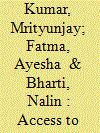

|
|
|
|
|
| Summary/Abstract |
Affordable access to medicines is a key determinant of a country’s resilience to health crises. The modern hyper-connected international trade and production networks have a vital role to play in ensuring this accessibility, especially in the context of a pandemic. This article focuses on medicines and medical equipment and analyses the synergistic role of the two international organisations—The World Trade Organisation (WTO) and The World Health Organisation (WHO), in assuring affordable access to these goods globally. WHO is responsible for global healthcare regulations; however, the medical supply chain originates in a few developed countries, manufactured in bulk (in case of medicine) at low cost in developing countries, and finally traded worldwide. Here, the role of WTO comes in where it facilitates global trade cooperation and intellectual property rights monitoring, both key elements in medical goods production and trading. Despite the need for cooperation in mitigating COVID-19, much of the global response to COVID-19 has been fragmented and inward-looking. This lack of coordination has serious repercussions especially for developing countries. We use qualitative content analysis methodology, connecting concepts of cooperation theory and global governance to identify the joint role of the two organisations in fostering global cooperation in medical goods accessibility.
|
|
|
|
|
|
|
|
|
|
|
|
|
|
|
|
| 2 |
ID:
183859
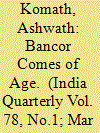

|
|
|
|
|
| Summary/Abstract |
John Maynard Keynes proposed the concept of ‘Bancor’ in 1940 as a supranational currency that would serve as the international reserve currency. The concept did not take off at the time, despite the underlying need to liberate the international system from the hegemonic tendencies of a national currency serving as a global medium of exchange. The emergence of Bitcoin makes it possible to revive the idea of a de-nationalised global medium of exchange. This article examines the feasibility of such an idea by examining a viable state policy for adoption and use in the international realm.
|
|
|
|
|
|
|
|
|
|
|
|
|
|
|
|
| 3 |
ID:
183857
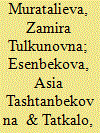

|
|
|
|
|
| Summary/Abstract |
The article examines the set of tools that China is using to expand its influence in Kyrgyzstan’s security sphere and the relationship of these actions to Russia’s traditional role in the region. Through in-depth interviews with experts in the military field, the authors conclude that Beijing is gradually ‘maximising power’ in relation to Russia, which still occupies a leading position in Central Asia (including education and the supply of weapons), in a manner that is non-aggressive and covert. These actions are reflected in the non-institutionalised nature of China’s interactions with countries in the region, which are more beneficial, in contrast, to institutionalised mechanisms. Beijing is betting on its ‘safe city’ system in Central Asia, which will allow the country to solve its own internal problems (Uyghur separatism, terrorism) while also strengthening Chinese influence in the security sphere by permitting it access to the data of Kyrgyz citizens and by making Kyrgyzstan more financially dependent on China; its educational programs for security service employees in Central Asia, which will, in turn, prepare the ground for the legalisation of the activities of Chinese PMCs (military contractors or ‘private military companies’).
|
|
|
|
|
|
|
|
|
|
|
|
|
|
|
|
| 4 |
ID:
183860


|
|
|
|
|
| Summary/Abstract |
India and South Africa approached the World Trade Organisation to negotiate the temporary waiver of Intellectual Property (IP) rights on Covid-19 vaccines to remove the artificial barrier of patents and boost vaccine production. This commentary advocates for the waiver of IP rights on Covid-19 vaccines. First, the article makes a case for the debate on the validity of the Covid-19 vaccine to qualify for a patent. Market failure and underinvestment in research and development arguments do not hold for granting a patent to Covid vaccines. Next, the article briefly reviews the evidence on the association between vaccination and virus mutations. Evidence suggests that waiving patents is vital to increase vaccination worldwide and curb mutation and reduce the risk of more infectious new variants. Finally, the article argues that the rationale for a patent is economical, based on incentivising innovation and therefore, the losses suffered by various sectors of the economy due to new variant induced fatalities and lockdowns need to be considered for a case for its waiver.
|
|
|
|
|
|
|
|
|
|
|
|
|
|
|
|
| 5 |
ID:
183855
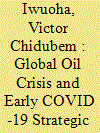

|
|
|
|
|
| Summary/Abstract |
African countries have been hit by a dual shock of COVID-19 pandemic and global oil crisis, which have caused severe economic and social disruptions. Most studies shed light on the correlates between COVID-19 and the global oil crisis, including their economic impacts on oil producing/exporting countries. However, the objective of this study is to examine the effects of the global oil crisis on the implementation of World Health Organization’s (WHO) healthcare and public health measures to contain COVID-19 in Nigeria. Empirical data from Nigeria was collected and analysed using content analysis based on WHO’s methodology. There was low level of healthcare preparedness and emergency response capacities to contain the COVID-19 pandemic. Public health measures against COVID-19 such as lockdowns and social distancing policies were poorly implemented at the expense of the people without adequate countercyclical stimulus packages and palliatives.
|
|
|
|
|
|
|
|
|
|
|
|
|
|
|
|
| 6 |
ID:
183854


|
|
|
|
|
| Summary/Abstract |
The COVID-19 pandemic originated in Wuhan, China, in December 2019. The virus has spread across the globe over the last 20 months. In the interest of public health, the World Health Organization (WHO) has declared a public health emergency to harmonise international responses to the virus. In a strongly interconnected world, the effect of the pandemic goes beyond mortality and morbidity. The unprecedented outbreak of COVID-19 has also resulted in a global economic crisis. Almost every sector of the economy has been gravely affected by the pandemic to various degrees.
In an attempt to curb the spread of the virus many countries have initiated measures such as lockdowns, travel restrictions, ban on public and private transportation, closure of schools and colleges and restrictions on public and social gatherings. These initiatives have led to the decline in GDP, foreign trade and foreign exchange reserves, the rise of unemployment, the crash of stock markets and the depreciation of national currencies among other things.
|
|
|
|
|
|
|
|
|
|
|
|
|
|
|
|
| 7 |
ID:
183853
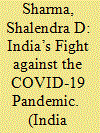

|
|
|
|
|
| Summary/Abstract |
In early 2020, when the COVID-19 pandemic was indiscriminately spreading around the world, the seeming ability of India, the world’s second most populous country (with over 1.3 billion people), to contain the virus within its borders and keep COVID-19 infection and mortality rates low relative to population size was seen as miraculous. However, the miracle ended when the ‘second-wave’ hit India in April 2021. On 1 May 2021, India became the first country in the world to record more than 400,000 coronavirus infections in a single day. This exponential rise in COVID-19 cases started on 28 April 2021 when India recorded 379,459 new COVID-19 cases and 3,647 deaths. This marked the eighth straight day of more than 300,000 cases a day—making India the second-highest COVID-19 case count in the world (over 20 million) with over 25 per cent of the global deaths from COVID. The following examines India’s fight against the pandemic, the failure to contain the second wave, the lessons learned and the way forward.
|
|
|
|
|
|
|
|
|
|
|
|
|
|
|
|
| 8 |
ID:
183858
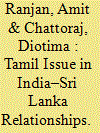

|
|
|
|
|
| Summary/Abstract |
More than 25 years of ethnic war in Sri Lanka ended in 2009. Expressing ‘serious concerns’ on human rights situation in post-civil war Sri Lanka, the United Nations Human Rights Council (UNHRC) has adopted critical resolutions. The eighth such resolution was adopted in March 2021. India abstained for the second time from voting on a resolution against Sri Lanka at the UNHRC since 2014. In 2012 and 2013, India voted in favour of resolutions that have been critical of Sri Lanka. This article, examines the shift in India’s approach towards the Tamil issue in Sri Lanka.
|
|
|
|
|
|
|
|
|
|
|
|
|
|
|
|
|
|
|
|
|